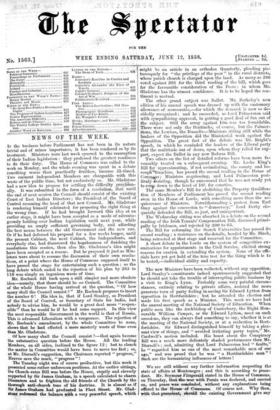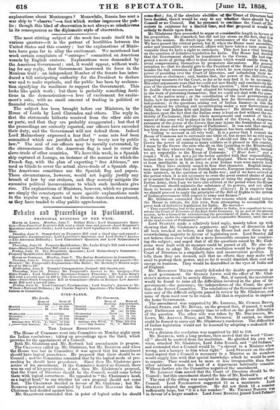NEWS OF THE WEEK.
Is the business before Parliament has not been in its nature trivial and of minor importance, it has been rendered so by its treatment. Ministers were last week spurred to the resumption of their Indian legislation : they professed the greatest readiness to do their duty. The House of Commons was called to the work on Monday, and the whole evening was spent in a debate Something worse than practically fruitless, because ill-timed. Two eminent independent Members are chargeable with this waste of the public time, but not exclusively so. Mr. Gladstone had a new idea to propose for settling the difficulty provision- ally. It was submitted in the form of a resolution, that until the end of next session the Council should consist of the existing Court of East Indian Directors ; the President 9f, the Board of Control assuming the head of that new Council. Ms. Gladstone is rendering himself celebrated for proposing the right thing at the wrong time. If he had brought forward this idea at an earlier stage, it might have been accepted as a mode of advanta- geously holding over Indian legislation until next year, while providing an amply sufficient governing body, and affording the best nexus between the old. Government and the new one. Or if he had deferred his proposal for a few weeks longer, until the present Cabinet, the next Cabinet, the Independents, and everybody else, had discovered the hopelessness of finishing the resolutions this session, then also Mr. Gladstone's idea might have been accepted as a rescue. But he proposed it just as Min- isters were about to resume the discussion of their own resolu- tions, at a point where the House of Commons supposed itself to have passed the stage for entertaining such a question ; so the long debate which ended in the rejection of his plan by 265 to 116 was simply an ingenious waste of time.
Mr. Roebuck fell back upon a still simpler and more obsolete idea—namely, that there should be no Council. The Committee
of the whole House having arrived at the question, " Of how many shall the Council consist ?" Mr. Roebuck proposes to insert the number 0! His idea is, that if Lord Stanley, as President of the Board of Control, or Secretary of State for India, had nobody to advise him, he would be a great deal more "respon- sible " than he would be if he had some support. In this view the most responsible Government in the world is that of Russia. This is advanced Liberalism with a vengeance. The rejection of Mr. Roebuck's amendment, by the whole Committee to none, shows that he had effected a more masterly waste of time even than Mr. Gladstone.
. Of how many shall the Council consist ?—that again became the substantive question before the House. All the leading Members, on all sides, inclined to the figure 12 ; but to clench the matter in Committee would have been to move too fast ; so, at Mr. Disraeli's suggestion, the Chairman reported " progress," Heaven save the mark, " progress " ! The Tuesday night was of course productive, but this week it presented some rather unforeseen positions. At the earlier sittings, the Church-rates Bill was before the House, stoutly and cleverly supported by Sir James Graham, in a speech ca'culated to charm Dissenters and to frighten the old friends of the Church by the thorough anti-church tone of his doctrine. It is almost as if Sir James Graham had graduated in Fleet Street. Mr. Glad- stone redressed the balance with a very powerful speech, which might be an article in an orthodox Quarterly, pleading pic- turesquely for " the privilege of the poor " in the rural districts, whose'parish church is charged upon the land. As many as 266 voted against 203 for the third reading of the bill, which goes for the favourable consideration of the Peers ; in whom Mr. Gladstone has the utmost confidence. It is to be hoped the sen- timent is mutual.
The other grand subject was Ballot. Mr. Berkeley's new edition of his annual speech was dressed up with the customary allowance of nouveautes,—for which the demand is now so de- cidedly recognized ; and he succeeded, as Lord Palmerston said with sympathizing approval, in getting a good deal of fun out of the subject. Still the array against him was too formidable. There were not only the Bentincks, of course, but the Palmer- stons, the Lewises, the Russells—Ministers sitting still while the leaders of the Opposition did the Ministerial work against the Opposition. The great fact of the debate was Mr. Bright's speech, in which he reminded the leaders of the Liberal party that the multitude but of doors, upon whom they relied for sup- port, expect the Ballot in any new Reform Bill.
Two others on the list of detailed reforms have been more fa- vourably treated on a subsequent evening. Mr. Locke King's Bill Ygr approximating, if not assimilating, the county and bo- rongRafranchise, has passed the second reading in the House of Co; Ministers acquiescing, and Lord Palmerston posi- tive' sisting, though he announced that he was not ready yet to down to the level of 101. for counties.
Th same Member's Bill for abolishing the Property Qualifica- tion of Members of Parliament has passed the second reading even in the House of Lords, with something more than the ac- quiescence of Ministers. Notwithstanding a protest from Earl Grey against the concession to " democracy," Lord Derby elo- quently defended the Bill, as just, and unimportant. The Wednesday sitting was absorbed in a debate on the second reading of the Irish Tenants' Compensation Bill, discussed princi- pally by Irishmen, and rejected by 200 to 65.
The Bill for reforming the Scotch Universities has passed its second reading ; a resistance on the details' headed by Mr. Black, being retracted at that stage and reserved for, the Committee.
A short debate in the Lords on the system of competitive ex- aminations for appointments in the Civil Service, elicited strong
reasons for caution in extending the system. None 'of the off -cials have yet got hold of the true test for the thing which is to be tested,—individual ability and capacity.
The new Ministers have been reelected, without any opposition. Lord Stanley's constituents indeed spontaneously suggested that he should not take the trouble of interrupting public business by a visit to King's Lynn. Probably some very painful circum- stances, entirely relating to private affairs, assisted the more generous turn of party feeling in saving Sir Edward Lytton from- opposition in Hertfordshire ; but he attended the election and made his first speech as a Minister. This week we have had the annual meeting of the National Society of Education. When public men like the Archbishop of Canterbury, the Right Hon- ourable William Cowper, or Sir Edward Lytton, meet on such occasions, they can always find something to say, whether it is at the meeting of the National Society, or at a reelection in Hert- fordshire. Sir Edward distinguished himself by taking a plea- sant view of things, and " avoided irritating party topics," Mr. Cardwell's motion included. His boast about the Conspiracy Bill was a much more delicately shaded performance than Mr. Disraeli's ; and, admitting that Lord Palmerston had " faults," he " regarded him as one of the most remarkable men of our, age," and was proud that he was . " a Hertfordshire man" ! Such are the humanizing influences of letters !
We are still without any further information respecting the state of affairs at Montenegro ; and this is according to prece- dent. Mr. Seymour Fitzgerald stated in the House of Commons, on Thursday, that the war with Persia was declared, and carried on, and peace was concluded, without any explanations being oared to the House--of Commons. Of course not. Why then, with that Feeedentp. should: the existing Government give any explanations about Montenegro ? Meanwhile, Russia has sent a war ship to " observe "—a fact which rather impresses the pub- lic ; though this kind of observation is not always so mischievous in its consequences as the diplomatic style of observation.
The most stirring subject of the week has made itself felt is various quarters—it is the portent of hostilities between the United States and this country ; but the explanations of Minis- ters have gone far to allay the excitement. We mentioned last week certain complaints of " outrages " committed on American vessels by English cruisers. Explanations were demanded by the American Government ; and, it would appear, without wait- ing for any reply, that Government increased its force in the Mexican Gulf ; an independent Member of the Senate has intro- duced a bill anticipating authority for the President to declare war and to make reprisals, and the public has been by acclama- tion signifying its readiness to support the Government. This looks like quick work ; but there is probably something facti- tious in the demonstration—a love of excitement for excite- ment's sake, with no email amount of trading in political or financial stimulants.
The subject has been brought before our Ministers, in the House of Lords by Lord Clarendon and others. The reply is, that the statements hitherto received from the other side are ex parte, and that they are probably exaggerated ; but that if the proceedings are correctly reported, our officers have exceeded their duty, and the Government will not defend them. Indeed Lord Malmesbury expressed a fear that " some acts had been committed which are justified neither by treaty nor by public law." The zeal of our officers may be morally extenuated, by the circumstance that the American flag is used to cover the slave-trade of other countries. We have this week, in a Spanish ship captured at Loango, an instance of the manner in which the French flag, with the plan of exporting " free Africans," are used as blinds to cover the actual slave-trade of a Spanish ship. The Americans sometimes use the Spanish flag and papers. These circumstances, however, would not legally justify any breach of law by our cruisers, and they scarcely mitigate the excessive political inconvenience to which such incidents give rise. The explanations of Ministers, however, which we presume are simply the counterparts of more specific explanations made in the regular way, must tend to disarm American resentment, s they have tended to allay public apprehension.



























